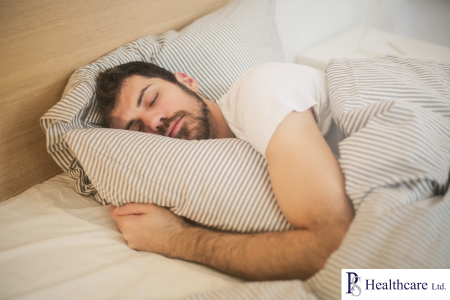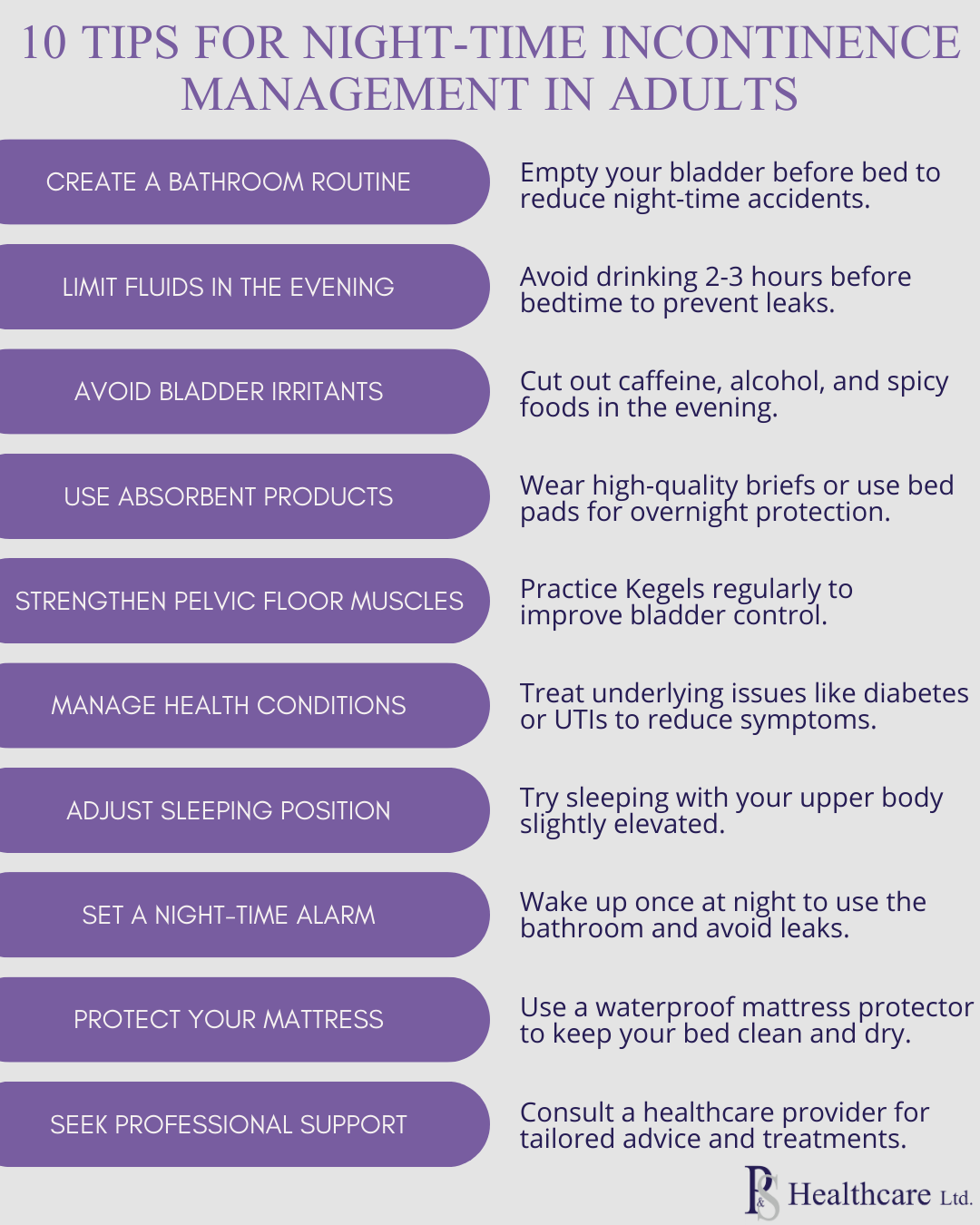10 Tips for Night-Time Incontinence Management in Adults

Night-time incontinence, also known as nocturnal enuresis, can be challenging for adults to manage. It disrupts sleep, causes discomfort, and can impact emotional wellbeing. However, with the right strategies, night-time incontinence can be effectively managed, allowing for better rest and improved confidence. Here are ten tips to help manage night-time incontinence in adults:
1. Create a Consistent Bathroom Routine
Establishing a routine for urinating before bed helps reduce the risk of accidents during the night. Even if you don’t feel the urge, making it a habit can help ensure your bladder is as empty as possible.
2. Limit Fluids in the Evening
Reduce fluid intake two to three hours before bedtime. Focus on hydrating earlier in the day to ensure you’re not dehydrated but avoid excessive drinking at night.
3. Avoid Bladder Irritants
Certain drinks and foods can irritate the bladder, increasing the likelihood of night-time leakage. Common irritants include caffeine, alcohol, spicy foods, and carbonated beverages. Opt for bladder-friendly alternatives, especially in the evening.
4. Use Absorbent Products
Investing in high-quality incontinence products, such as absorbent briefs or bed pads, can provide peace of mind and prevent damage to bedding. Modern designs are discreet, comfortable, and effective for overnight use.
5. Strengthen Pelvic Floor Muscles
Regularly practicing pelvic floor exercises (Kegels) can help improve bladder control. These exercises target the muscles responsible for supporting the bladder and can reduce the frequency of leaks over time.
6. Manage Underlying Health Conditions
Night-time incontinence can sometimes be linked to medical conditions such as diabetes, sleep apnea, or urinary tract infections. Consulting a healthcare provider to address these issues can significantly improve symptoms.
7. Adjust Sleeping Position
Sleeping in a slightly elevated position, such as with the head and upper body propped up, can reduce pressure on the bladder and help minimise leaks. Experimenting with positions may reveal what works best for you.
8. Set a Night-Time Alarm
For some individuals, setting an alarm to wake up and use the bathroom once during the night can prevent accidents. This technique works well if you can predict when your bladder is most likely to need emptying.
9. Protect Your Mattress
Using a waterproof mattress protector ensures your bed stays clean and dry, even in the event of an accident. Many modern protectors are noiseless and discreet, offering protection without compromising comfort.
10. Seek Professional Support
If night-time incontinence persists, don’t hesitate to seek advice from a healthcare professional. They can recommend treatments or lifestyle changes tailored to your needs.
Night-time incontinence is a common issue, but it’s manageable with the right strategies. Implementing these tips can make a significant difference in your quality of life, allowing you to sleep more peacefully and feel more in control. Remember, you’re not alone. Support and solutions are available to help you regain confidence and comfort.
For more resources and incontinence products, visit P&S Healthcare today!
And don't forget to download our handy inforgraphic, below.

More News:
- 10 Tips for Night-Time Incontinence Management in Adults
- 10 Ways to Manage Incontinence While Playing Sports
- 10 Tips for Managing Faecal Incontinence in Adults
- 10 Lifestyle Changes to Manage Urinary Incontinence Symptoms
- 10 Ways to Manage Urinary Incontinence During Pregnancy
- 10 Causes of Urinary Incontinence in Men and How to Treat Them
- 10 Practical Solutions for Coping with Incontinence at Work
- 10 Myths About Menopause and Incontinence You Should Stop Believing
- 10 Foods to Avoid to Prevent Bladder Irritation and Incontinence
- 10 Effective Pelvic Floor Exercises for Urinary Incontinence
- 10 Common Causes of Bedwetting in Children and How to Address Them
- Causes of Faecal Incontinence
- Breaking the Silence: Managing Incontinence with Confidence
- Supporting Loved Ones with Incontinence: A Caregiver's Guide
- Top 10 Tips for Managing Incontinence Comfortably This Christmas
- Pregnancy and Postpartum Incontinence: Prevention and Recovery
- 10 Random Facts About Pee You Probably Didn't Know
- Diet and Bladder Health: Foods That Help and Hurt
- Helping Your Child Manage Incontinence: A Parent's Resource
- The Most Common Bladder Control Problems and How to Manage Them
- 10 Things That Can Make Incontinence Worse
- Incontinence Myths vs Facts - Dispelling Common Misconceptions
- Top 10 tips to help with bladder control during pregnancy
- 10 Effective Ways to Stop Bladder Leaks & Manage Incontinence
- P&S Washable Face Mask with ViralOff
- New Product For Men - The Slip Brief
- New Monthly Protection Briefs For Women
- New Product - The OooPS Pant for Stress Incontinence
- New Adult Inco-elite Range Launched
- EMDA WOMEN OF WORTH AWARD 2009
- New Website Launched
- New Website Under Development

